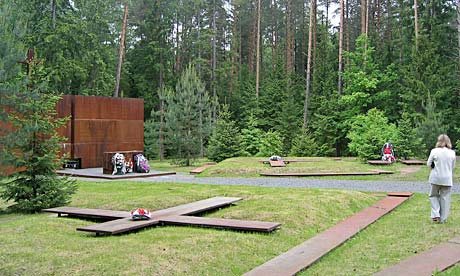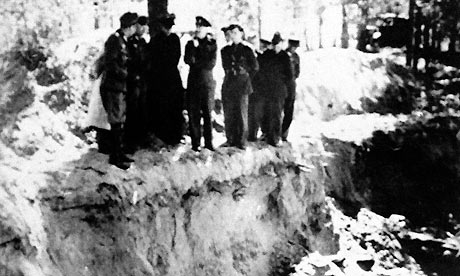Russian parliament admits guilt over Polish massacre
Symbolic acknowledgment of culpability over Katyn murders in 1940 signals Russia's willingness to face up to its past
- guardian.co.uk,
- Article history
- guardian.co.uk,
- Article history

A memorial dedicated to the Polish officers murdered in the Katyn forest in 1940. Photograph: Dario Thuburn/AFP/Getty Images
In a symbolic admission of guilt, Russia's parliament has declared that Joseph Stalin ordered his secret police to execute 22,000 Polish army officers and civilians in 1940, in one of the greatest mass murders of the 20th century.
Today's acknowledgment of Stalin's personal culpability over the Katyn massacre comes amid a cautious thaw between Moscow and Warsaw, whose recent relations have been thorny at best. It was also seen as a sign that Russia may finally be ready for muted self-scrutiny over its totalitarian past.
Mikhail Gorbachev admitted in 1990 that the NKVD was to blame for the massacre, after a half-century of the Soviets blaming it on Nazi troops. However, there has never been a formal statement which implicates the Soviet leadership in such explicit terms.
Officials in Warsaw greeted the declaration positively. "It is a good step, an important sign," Poland's speaker of parliament, Grzegorz Schetyna, told reporters. It would ensure a "better atmosphere" for Russian president Dmitry Medvedev's visit to Warsaw next week, he added.
The 21,768 officers, doctors, policemen and other public servants – captured by the Red Army when it swept into Poland after the outbreak of the second world war in 1939 – were mainly shot in Katyn forest near Smolensk in western Russia and in several other places.
The current improvement in ties accelerated after Poland's then president, Lech Kaczynski, and 95 other people including scores of high-ranking government and military figures, died in April when their plane crashed on landing at Smolensk. The passengers were on their way from Warsaw to attend an event commemorating the 70th anniversary of the massacre.
In the wake of the crash, Russia's prime minister, Vladimir Putin, made unequivocal statements about Soviet responsibility for the Katyn massacre and urged reconciliation. Historian Natalya Lebedeva, a Russian member of the two countries' intergovernmental commission on "especially complex questions", told the Guardian that Putin's words had helped the healing process. "Both Russia and Poland realise it is time to stop the confrontations," she added.
Moscow and Warsaw have clashed in the past decade over Poland's admission to the EU and Nato, and over US plans for missile defence sites in eastern Europe.
However, Eugeniusz Smolar, a senior fellow at the Polish Institute of International Affairs, said that the Kremlin now felt it had to engage with Warsaw as a major economic power in the region.
A change to pro-Russian leadership in Ukraine and the prospect of Russia joining the US missile defence shield also helped. "On a human level, Poles were also very touched by so many Russians coming to our embassy in Moscow to show sympathy after the Smolensk disaster," he added.
-----------------------------------------
Russia posts Katyn massacre documents online
The publication of Soviet documents about Russia's 1940 massacre of Polish officers is the latest diplomatic gesture towards Warsaw

German and Allied officers who were PoWs look over a partly-emptied mass grave in the Katyn forest in Russia. Secret Soviet documents about Russia's massacre of Polish prisoners have now been published on the internet. Photograph: AP
Russia today posted documents concerning the massacre of Polish prisoners in Katyn on a government website, and said it would release further archive material dealing with Soviet-era repression.
Russia's president, Dmitry Medvedev, said he had personally ordered the online publication of the archive on the massacre, which took place 70 years ago when Soviet secret police shot 22,000 Polish officers near Katyn in western Russia.
The documents have been published before in Poland and Russia. But the decision to publish them online is the latest positive gesture by Moscow to Warsaw after this month's air disaster that killed Poland's president, Lech Kaczynski.
The crash provoked an unprecedented Russian reaction, with Medvedev attending Kaczynski's funeral in Krakow and the prime minister, Vladimir Putin, leading the investigation into why Kaczynski's plane went down.
Medvedev suggested Russia would now release further classified documents on the massacre. "The Katyn archives are open. [But] there are certain materials that have not yet been forwarded to our Polish partners," Medvedev said.
Pledging greater openness, he added: "I have ordered that appropriate work be carried out and materials that are interesting to our Polish colleagues be handed over to them."
Human rights groups say that Russia has refused to hand over the most sensitive archive materials – which identify individual officers from the NKVD, the pre-KGB secret police – who carried out the killings.
Today, the head of Russia's state archives agency, Rosarchiv, Andrei Artizov, said the documents came from the top-secret archive of the politburo. They include a letter from Lavrenti Beria, the head of the NKVD, written in March 1940.
In it, Beria describes the Polish PoWs as "incorrigible enemies of Soviet power" and urges their liquidation. The archive includes the signatures of Stalin and other politburo members on a resolution authorising the murders – which Stalin subsequently blamed on the Nazis.
Artizov said all Soviet leaders after Stalin were told the truth about Katyn. He said the murders were carried out at three distinct sites: Pyatikhatka, near Kharkov; Katyn, near Smolensk; and Mednoye in Russia's Tver region. The largest number of Polish officers were shot dead in Mednoye, he said.
Historians said that the decision to post the documents on the internet was an important step to enable Russians to come to terms with their past.
Andrzej Kunert, a Polish historian, said the Kremlin's move was significant. "We can call the decision a breakthrough."

